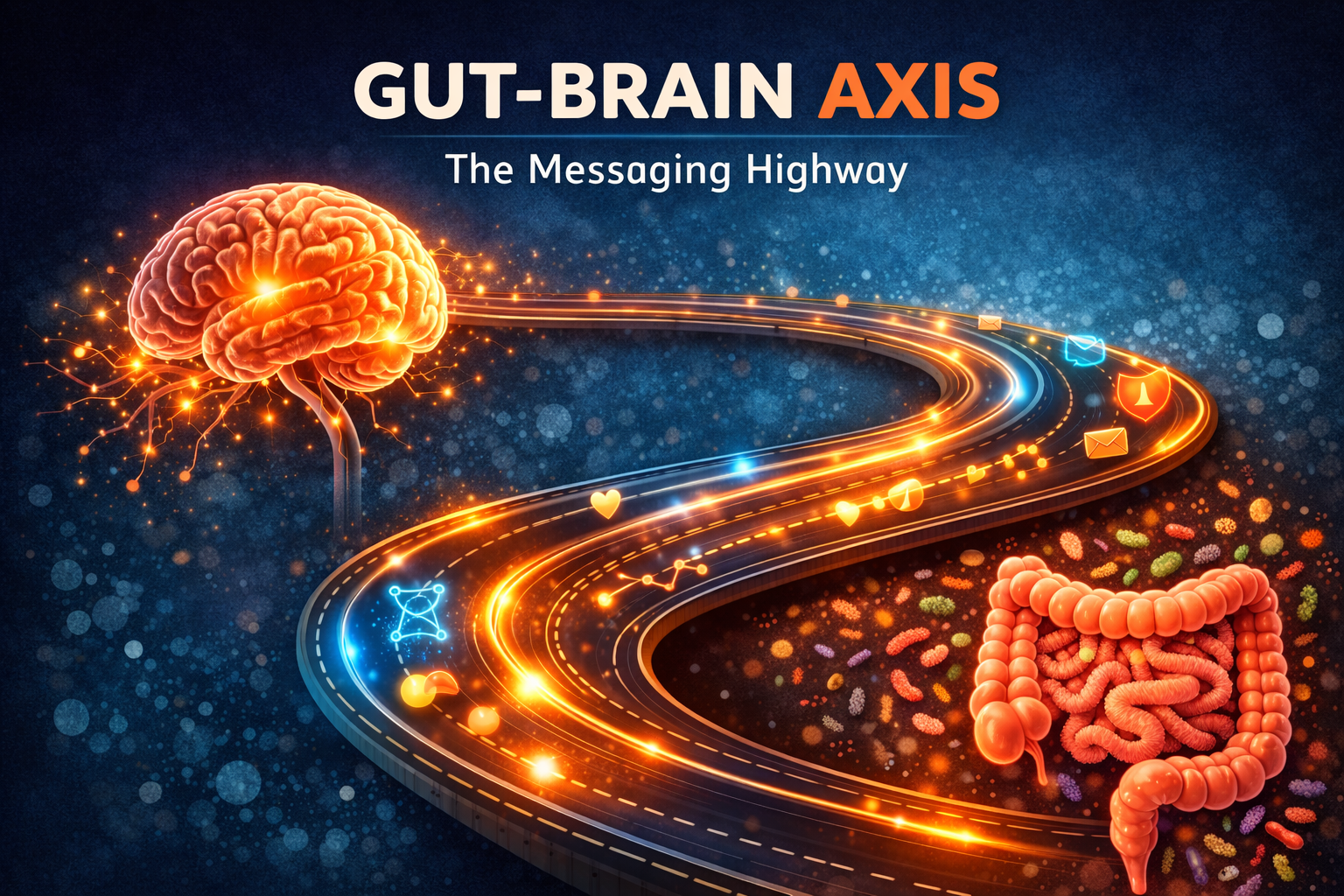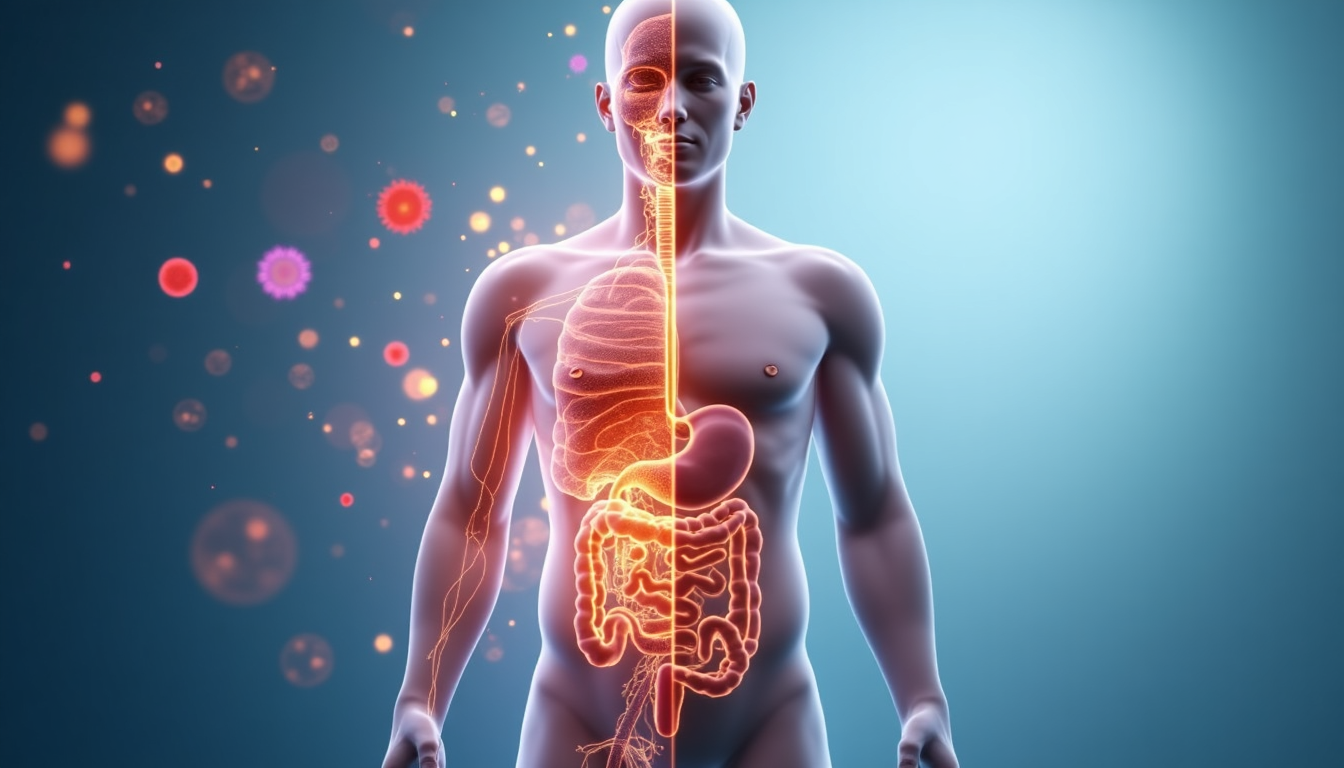
Hormone Imbalances and Sleep: Why Cortisol and Progesterone Matter
Hormone imbalance and sleep is often an overlooked relationship when considering sleep problems. Difficulty falling asleep, waking in the night, or feeling unrefreshed in the

If you’re living with ADHD, or frequently struggle with maintaining focus, motivation or
calmness, you’ve likely wondered why your brain operates in its unique way. Many
individuals describe feeling as though their minds are constantly active, though not always
channelled in their desired direction.
Historically, ADHD was simply viewed as a “dopamine deficiency.” However, more current
research reveals a more intricate picture. Multiple brain chemicals, genetic factors, and
even gut health all work together to influence our thought patterns, emotional responses,
and ability to concentrate.
Understanding this comprehensive perspective — including the role of neurotransmitters,
the gut-brain connection, and genetic testing for ADHD — can provide valuable insights
into your unique biology and reveal natural ways to support your brain function.
ADHD and the Brain’s Chemical Messengers
Our brains communicate through neurotransmitters, chemical signals that transmit
messages between nerve cells. The primary neurotransmitters associated with ADHD are
dopamine, noradrenaline, and serotonin.
Dopamine drives motivation and reward — keeping you invested in tasks.
Noradrenaline enhances alertness and sustained attention under pressure.
Serotonin regulates mood, emotional balance and impulse management.
In ADHD, these neurotransmitter systems may function differently. Rather than a
straightforward “deficiency” of dopamine, research indicates dysregulation — where the
timing or sensitivity of brain signals isn’t optimally coordinated.
This explains why ADHD manifests differently across individuals: some struggle with starting
tasks, others find it challenging to moderate their activity levels, and many experience both.
Your unique brain chemistry shapes how ADHD presents in your daily life.
Why Genetics Matter in ADHD
Your genetic makeup significantly influences how effectively your body produces, uses and
recycles neurotransmitters. Small genetic variations can subtly impact your brain’s
management of neurotransmitters such as dopamine, GABA, serotonin and noradrenaline,
affecting everything from concentration and motivation to emotional regulation and stress
response (Yadav et al., 2021). These variations don’t indicate any “fault” in your brain’s
wiring, they simply highlight the uniqueness of your brain chemistry. Understanding your
genetic predispositions can help explain why certain foods, nutrients, or even environments
have particular effects on your focus, mood and energy levels (Annawald & Meyer, 2025;
Hunter et al., 2025).
Exploring Genetic Testing for Brain Chemistry
A nervous system genetic test provides personalised insights into your body’s key
neurotransmitter pathways most commonly associated with ADHD.
While genetic testing for ADHD-related pathways isn’t designed to diagnose, it can
highlight important patterns that may influence your cognitive function, particularly how
your brain manages attention, motivation and responses to stress.
Your genetic test results can reveal several key insights:
Learn more about the genetic nervous system test here
The Gut–Brain Axis: A Two-Way Conversation
Modern science has revealed a profound connection between the brain and gut, known as
the gut–brain axis. This sophisticated communication network integrates your nervous,
immune and digestive systems into a coordinated whole.
Your digestive system hosts trillions of microorganisms, collectively forming the gut
microbiome. This microscopic ecosystem plays crucial roles in managing inflammation,
nutrient absorption and, remarkably, contributing to neurotransmitter production and
mental well-being.
Recent studies indicate that individuals with ADHD often display differences in their gut
microbiome composition. Research suggests that certain beneficial bacteria involved in
dopamine and serotonin production may be present in lower quantities, while those
associated with inflammation might be more abundant. Interestingly, studies show that
individuals with ADHD are more likely to have digestive issues such as constipation,
flatulence, or irritable bowel syndrome (IBS) symptoms (Ng et al., 2025).
While this doesn’t suggest that gut health is a primary cause of ADHD, it demonstrates how
dietary choices, digestive health and microbiome balance can significantly impact cognitive
function, emotional well-being and mental clarity.
Microbiome Testing: Insights from the Inside Out
The efficiency of your body’s neurotransmitter production and clearance
mechanisms.
Specific nutrients that may be beneficial for your brain chemistry, such as vitamins D,
B, magnesium, omega-3 fatty acids, and zinc (Hunter et al., 2025).
How your genetic profile may influence various aspects of well-being, including sleep
patterns, concentration abilities and emotional balance (Burk et al., 2018; Tsuboi et
al., 2024; Siegel, 2022).
Armed with these insights, you can make informed decisions about lifestyle changes and
nutritional choices that align with your unique neurochemical makeup.
For those interested in exploring their gut-brain axis and understanding how digestive
health might influence cognitive function, microbiome (stool) testing offers valuable
information.
A comprehensive stool analysis can reveal:
Your gut microbiome diversity and overall balance
Your digestive efficiency and nutrient absorption capabilities
Inflammatory markers and gut barrier function that might affect cognitive
performance
Indicators of how your microbiome impacts neurotransmitter synthesis
These test results can inform personalised dietary and lifestyle recommendations, helping
establish a robust foundation for optimal brain function, improved focus and emotional
stability.
Learn more about the Comprehensive Digestive stool test here
Even without specific testing, you can begin nurturing your brain chemistry and gut health
through simple, consistent practices:
Maintain balanced nutrition by consuming a diet rich in whole foods to provide
essential nutrients to support overall brain and gut health (Shareghfarid et al., 2020).
Embrace a diverse range of plant-based foods rich in fibre and polyphenols to
support the health and diversity of your gut microbiome (Schneider et al., 2024).
Include omega-3 essential fatty acids from sources like oily fish, flaxseeds or chia
seeds to support brain function.
Exercise regularly — physical activity enhances dopamine sensitivity and promotes
healthy gut function.
Establish good sleep habits to allow proper brain and digestive system restoration.
Implement stress management techniques through mindfulness, relaxation and
nature exposure.
These consistent lifestyle modifications can yield noticeable benefits over time.
Bringing It All Together
ADHD involves more than just dopamine imbalances, it’s a sophisticated interplay between
brain chemistry, genetic factors and gut health. Through comprehensive genetic and
microbiome testing, you can develop a deeper understanding of what influences your focus,
motivation and emotional balance.
Understanding your unique neurochemistry isn’t about limitations, it’s about
empowerment. Armed with personalised insights, you can take targeted steps to support
your brain function holistically.
Q&A
Q: Can a genetic test diagnose ADHD?
A: No. Genetic testing can’t diagnose ADHD or confirm whether someone has it. However, it
can highlight patterns in genes that influence how your brain processes key
neurotransmitters. This can help explain why you might experience certain traits and guide
more personalised lifestyle and nutrition strategies.
Q: How does genetic testing help with ADHD-type symptoms?
A: A nervous system genetic report looks at how your body makes and regulates brain
chemicals that affect focus, motivation, and emotional balance. Understanding your unique
biology can help identify where extra nutritional or lifestyle support may be helpful — for
example, supporting dopamine or serotonin pathways through diet, stress management, or
sleep.
Q: What is the gut-brain axis, and why is it important?
A: The gut-brain axis is the two-way communication network between your digestive system
and your brain. The gut produces many of the same neurotransmitters that influence focus
and mood, such as serotonin and dopamine precursors. A healthy gut can support clearer
thinking and more balanced energy, while gut imbalances may contribute to brain fog,
fatigue, or low mood
Q: Can gut health really influence ADHD symptoms?
A: Emerging research suggests that people with ADHD often have differences in their gut
microbiome compared with those without. This doesn’t mean gut health causes ADHD, but
it may influence how neurotransmitters function. Supporting your microbiome through
nutrition — or exploring stool (microbiome) testing — can be one way to strengthen this
gut-brain connection.
Q: What does a microbiome test involve?
A: The test involves simply collecting a sample of your stool at home and sending it to the
lab with convenient prepaid packaging and clear instructions. Your report provides details
on microbial diversity, digestive efficiency, and gut inflammation markers. These insights
can help you (and your practitioner, if you choose to work with one) understand how your
gut health may be influencing your overall well-being.
Q: Do I need both genetic and microbiome testing?
A: Not necessarily. Some people start with one type of test based on their current health
priorities. Genetic testing provides insights into your lifelong tendencies (how your brain
and body are “wired”), while microbiome testing shows what’s happening right now in your
gut. Together, they can offer a fuller picture, but either can be valuable on its own.
Q: What kind of support will I receive after testing?
A: When you order through Smart Nutrition, your results are delivered with professional
interpretation and practical recommendations. This ensures you understand what your
results mean, and how to take action safely and effectively through diet and lifestyle
support.
Q: Do I need to stop medication before doing these tests?
A: For genetic testing, no changes are usually required, your genes don’t change with
medication.
For microbiome (stool) testing, certain medications can affect your results. It’s best to avoid
antibiotics, anti-fungal, and bowel-cleansing agents for at least four weeks beforehand
where possible. Medications that alter gut motility, acid levels, or probiotics may also
temporarily change microbial patterns.
Comprehensive guidelines are provided with test kits, but if you’re unsure, always check
with your healthcare provider before making any changes.
Q: How long do results take?
A: Both the nervous system genetics and microbiome (stool) tests typically take around 4
weeks from the date the lab receives your sample.
Q: Who can benefit from this type of testing?
A: Anyone curious about their focus, motivation, mood, or digestive health can benefit from
learning more about their genetic and gut profile, whether or not they have a formal ADHD
diagnosis. Understanding your biology gives you the knowledge to make more targeted,
informed choices about your health.
References
Annawald, K., & Meyer, T. (2025). Modifiable unhealthy lifestyle behaviours in subclinical
manifestations of attention-deficit hyperactivity disorder: what are the first empirical results
and putative clinical implications? BJPsych Open, 11(2), e66.
https://doi:10.1192/bjo.2024.837
Burk, J.A., Blumenthal, S.A., & Maness, E.B. (2018). Neuropharmacology of attention. Eur J
Pharmacol, 835, 162-168. https://doi.org/j.ejphar.2018.08.008
Hunter, C., Smith, C., Davies, E., Dyall, S.C., & Gow, R.V. (2025). A closer look at the role of
nutrition in children and adults with ADHD and neurodivergence. Frontiers in Nutrition, 12.
https://doi.org/10.3389/fnut.2025.1586925
Ng, R.W., Chen, Z., Yang, L., Wong, O.W., Leung, A.S., Tsui, K.W., et al. (2025). Association
between attention-deficit/hyperactivity disorders and intestinal disorders: A systematic
review and Meta-analysis. Nature, 15. https://doi.org/10.1038/s41598-025-04303-x
Schneider, E., O’Riordan, K.J., Clarke, G., & Cryan, J.F. (2024). Feeding gut microbes to
nourish the brain: unravelling the diet-microbiota-gut-brain axis. Nature Metabolism, 6,
1454-1478. https://doi.org/10.1038/s42255-024-01108-6
Shareghfarid, E., Sangsefidi, Z.S., Salehi-Abargouei, A., Hosseinzadeh, M. (2020). Empirically
derived dietary patterns and food groups intake in relation with Attention
Deficit/Hyperactivity Disorder (ADHD): A systematic review and meta-analysis. Clinical
Nutrition ESPEN, 36, 28-35. https://doi.org/10.1016/j.clneso.2019.10.013
Siegel, J.M. (2004). The Neurotransmitters of Sleep. Journal of Clinical Psychiatry, 65(16), 4-Available from: https://pmc.ncbi.nlm.nih.gov/articles/PMC8761080/
Tsuboi, D., Nagai, T., Yoshimoto, J., & Kaibuchi. (2024). Neuromodulator regulation and
emotions: insights from the crosstalk of cell signaling. Frontiers in Molecular Neuroscience,
17, 1376762. https://doi.org/10.3389/fnmol.2024.1376762
Yadav, S.K., Bhat, A.A., Hashem, S., Nisar, S., Kamal, M., Syed, N., et al. (2021). Genetic
variations influence brain changes in patients with attention-deficit hyperactivity disorder.
Translational Psychiatry, 11(349). https://doi.org/10.1038/s41398-021-01473-w

Hormone imbalance and sleep is often an overlooked relationship when considering sleep problems. Difficulty falling asleep, waking in the night, or feeling unrefreshed in the

‘Detox’ has become one of the most misunderstood concepts in modern wellness. For many people, it brings to mind juice cleanses, restrictive diets or short-term resets promising quick results. Yet the body’s true detoxification systems are far more complex — and far more intelligent — than any cleanse.

Anxiety and gut health are closely linked through the gut–brain axis. Research suggests the gut microbiome, neurotransmitters and genetics may influence stress responses and emotional well-being. Exploring gut microbiome and nervous system insights can help build a more personalised understanding of anxiety.

Strange symptoms can puzzle anyone. Your body might show signs ranging from headaches and skin rashes to digestive problems and anxiety. Doctors sometimes struggle to explain these mysterious health issues that affect millions of people worldwide.
Please do not return samples to the laboratories that may arrive after Wednesday 27th March and up to and including Monday 2nd April.
The laboratories are closed from the 28th March – 2nd April for the Easter Holiday.